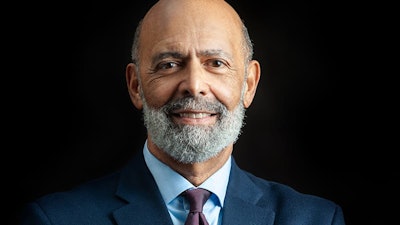The United Negro College Fund (UNCF) and Diverse: Issues In Higher Education held a Twitter town hall on Thursday to discuss UNCF’s latest report, HBCUs Transforming Generations: Social Mobility Outcomes for HBCU Alumni.
The report quantifies the social mobility experienced by students who attend historically Black colleges and universities (HBCUs), and how these institutions have contributed to the advancement and livelihood of Black and low-income families.
 Dr. Michael L. Lomax
Dr. Michael L. Lomax
Using data from Opportunity Insights, a nonprofit and non-partisan research and policy institute based out of Harvard University, UNCF revealed that over half of all institutions in the 95th percentile of providing social mobility into the middle class were HBCU schools. In fact, all but six HBCUs scored higher than the 90th percentile of social mobility.
This means that HBCUs are able to effectively uplift their students from some of the lowest earning to some of the highest earning sectors of the American economy.
To find out exactly how successful HBCUs have been at providing social mobility, UNCF studied the access and success rate of all U.S. institutions. Access is an assessment of the percentage of students able to attend an institution whose family income is less than $46,000 per year, otherwise defined as the bottom 20% of earners. Success is defined by the percentage of students from that bottom 20% who were able to earn a higher level of income after graduation.
Nationwide, institutions admit these low-income earners at a rate of 22.5%; Ivy Plus schools (all Ivy leagues with the additions of Stanford University, Duke University, the University of Chicago, and MIT) admit 9.3%. But HBCUs admit 51.3%.
“This demonstrates HBCUs outsized impact on underserved communities,” notes the UNCF report. “HBCUs serve more economically disenfranchised students than most U.S. institutions” while facilitating those student’s social mobility.
Fifty percent of HBCUs with the highest access rate in the country are located in rural communities. The majority of students who attend HBCUs are Black and Pell-eligible, and nearly 40% of HBCU students are first-generation students.
There are 101 HBCUs in the U.S. including D.C. and the U.S. Virgin Islands. Despite making up only 3% of all higher education institutions, HCBUs educate 10% of all Black college students. Almost 20% of all science, technology, engineering, and mathematics (STEM) degrees earned by Black graduates are awarded by HBCUs. Eighty percent (80%) of Black judges, 50% of Black doctors, and 50% of Black lawyers all matriculated at an HBCU.
According to the report, an HBCU graduate who works full time throughout their career can expect to earn $927,000 in additional income as opposed to non-college goers or Black students at non-HBCUs.
“HBCUs are ‘minority suppliers’ of diverse talent,” tweeted Dr. Roslyn Clark Artis, president of Benedict College, a private HBCU located in South Carolina. “The culturally immersive environment at HBCUs frees students up to focus on their academics rather than how to assimilate in an environment that is not intentionally created to meet their unique learning needs.”
HBCUs are tremendously underfunded through years of systemically prejudiced state and federal policies and uneven philanthropic giving. As the saying goes, HBCUs do more with less, but panelists at the town hall that was moderated by Dr. Jamal Watson, urged philanthropists and members of the Black community to find ways to support these institutions, which are, as the UNCF report notes, “the only higher education institutions with objective centered on increasing economic and educational opportunities for the Black community.”
 Dr. Roslyn Artis
Dr. Roslyn Artis
Some mobility reports focus only on steeper economic stratifications, looking for those institutions who propel their students into the top ten percent of earners. But, the report specifically looked to assess the transition into the middle class, arguing that “even a 10% shift [in income] can translate into life-altering access to health insurance, educational options, and expendable income that may ultimately drive outcomes that are both useful and necessary.”
To increase the range of influence that HBCUs have, participants in the Twitter town hall called for doubling the Pell Grant, canceling student debt, and rewriting budgets to find more ways to finance HBCUs to make up for years of underfunding.
“Additional funding would help close the gap in endowments,” tweeted Lomax. “According to U.S. Education Department data, the total endowments of all 101 HBCUs today is about $3.4 billion. More than 25 PWIs (Predominantly White Institutions) alone have larger endowments than all HBCUs combined.”
Dr. Walter M. Kimbrough, president of Dillard University in Louisiana, followed up Lomax’s tweet with the latest calculation of Harvard’s endowment: $53.2 billion.
“I would love to see endowment building with funds going specifically to close need gaps,” tweeted Kimbrough, who also called for increased support for students with food and housing insecurity.
“HBCUs still disproportionately produce the Black professional class,” Kimbrough tweeted. “When your segment is 70% Pell, students who achieve these careers become benefactors of social mobility.”
Jessmine M. Cornelius, program coordinator at UNCF and a product of an HBCU education, tweeted, “I say this with the most joy coupled with the biggest grin—the support of the HBCU is never done!”
“Perseverance and opportunity both play an indispensable role in the origin and sustainability of HBCUs,” tweeted Cornelius. “From the tenacity within each institution’s own story, to the many necessary facets of success that we see – from faculty and staff, students and alumni—HBCUS are vital in this movement simply by continuing to allow us access to a space to share with those who look like us and grow with us.”
Liann Herder can be reached at [email protected].
















